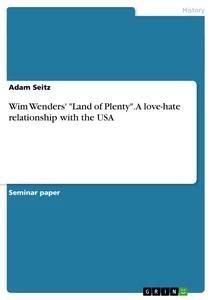
Zustellung: Sa, 07.06. - Do, 12.06.
Versand in 6 Tagen
VersandkostenfreiBestellen & in Filiale abholen:
Seminar paper from the year 2008 in the subject History Europe - Other Countries - Newer History, European Unification, grade: 2,0, University of California, Berkeley (Department of History), course: U.S. Cultural and Intellectual History: Global Contexts, language: English, abstract: Wim Wenders' ambiguity, the love hate relationship with the United States was the main force behind the production of Land of Plenty (2004). It was shot within three weeks with ä small digital amateur camera, and only because the production of his next film Don t come knocking (2005) got delayed. The entire production of the movie took not more than six weeks. Without ä doubt, it is Wenders most political film so far. As a Christian, one (or, as he stated once, even his initial) ideä for the film was to set ä radically contrary ideä of being Christian against the fundamentalist Christendom of the Bush administration. His ambition was to fight against the treason [on democracy and freedom and] on all what is left of my childhood myth. As stated in the press release for Land of Plenty , it is ä film about the country he has been concerned with for many years and which he loves , ä very personal and sanguine film about those who still stand for this country s possibilities [ ], ä political essay. Typical for his artistic approach, Wenders did not want to make an angry film, but one that could contribute to healing ; ä profound difference to films by Michael Moore, a name often dropped in Germany in the context of Land of Plenty . Wenders, as he stated himself, wanted to explore the same territory as Moore, but, of course, in his very own way. In direct comparison to Moore , the Süddeutsche Zeitung, for example, grants Wenders more complex, sadly beautiful, inconceivable images and an overall more convincing approach.
Produktdetails
Erscheinungsdatum
13. August 2009
Sprache
englisch
Auflage
7. Auflage
Seitenanzahl
16
Autor/Autorin
Adam Seitz
Verlag/Hersteller
Produktart
kartoniert
Gewicht
40 g
Größe (L/B/H)
210/148/2 mm
ISBN
9783640398164
Bewertungen
0 Bewertungen
Es wurden noch keine Bewertungen abgegeben. Schreiben Sie die erste Bewertung zu "Wim Wenders' "Land of Plenty". A love-hate relationship with the USA" und helfen Sie damit anderen bei der Kaufentscheidung.









